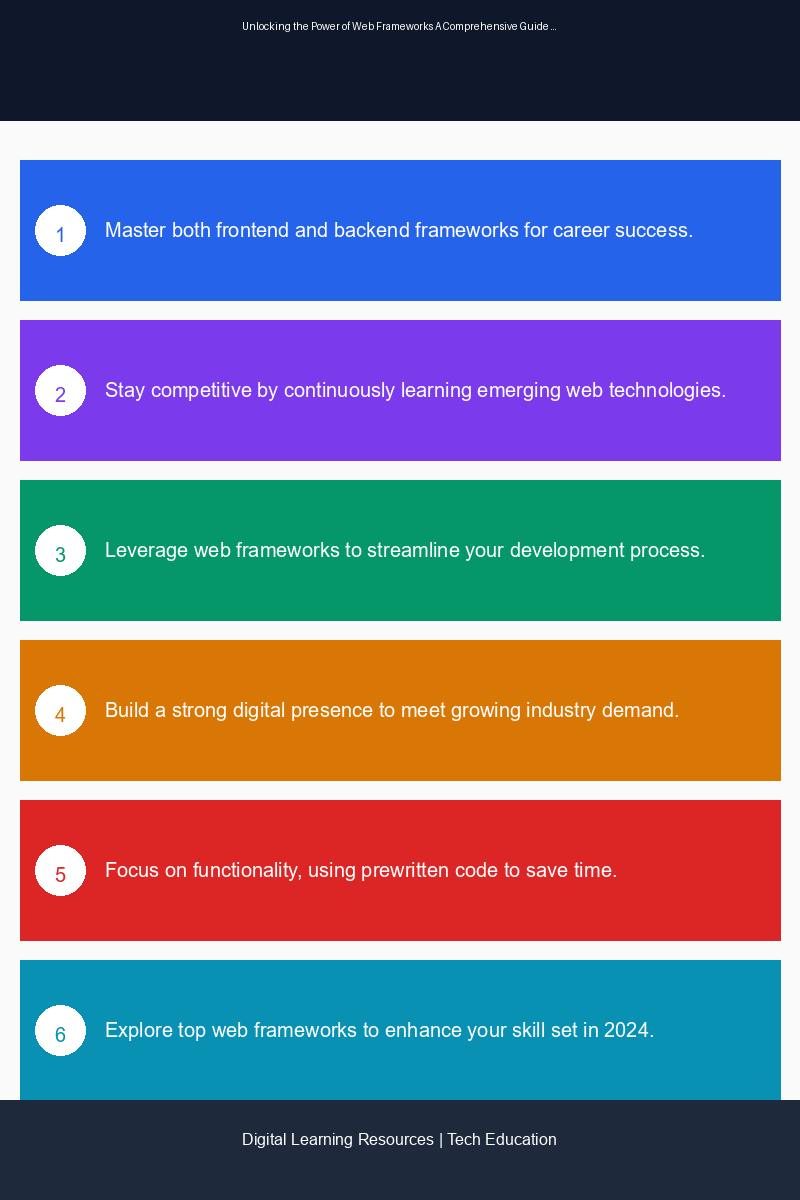In today’s digital landscape, mastering web frameworks is essential for developers, IT professionals, and tech learners alike. This guide will explore the definition, types, applications, and future trends of web frameworks, providing actionable insights to enhance your web development career in 2025 and beyond.
Key Takeaways
- Web frameworks streamline the development process by offering prewritten code and templates.
- Understanding both frontend and backend frameworks is crucial for a successful career in web development.
- Emphasis on digital presence creates a growing demand for skilled web developers.
- Continuous learning of emerging frameworks and technologies is vital for staying competitive.
Technical Background and Context
A web framework is a software platform designed to facilitate the development of websites, web APIs, and other online resources. By providing prewritten code, components, and application templates, web frameworks help developers focus on building functionality rather than getting bogged down by repetitive tasks.
Web frameworks can be categorized into two main types:
📚 Recommended Digital Learning Resources
Take your skills to the next level with these curated digital products:
AI Enhanced Resume Builder
AI Resume Builder Flask App – Complete Source Code + PDF Tutorial + HTML | Digital Download for Designers
Learn AWS: Your First Cloud Application
Learn AWS: Your First Cloud Application
📊 Key Learning Points Infographic

Visual summary of key concepts and actionable insights
Comprehensive SAT Prep: 470+ Vocabulary Words
Comprehensive SAT Prep: 470+ Vocabulary Words
Master DevOps in Practice – 50 Essential Topics for Engineers (PDF eBook)
Master DevOps in Practice – 50 Essential Topics for Engineers (PDF eBook)
The Ultimate Keyboard Shortcut Guide 49 Software Cheat Sheets in One PDF Bundle
The Ultimate Keyboard Shortcut Guide 49 Software Cheat Sheets in One PDF Bundle
- Frontend Frameworks: These frameworks focus on the user/client side, ensuring the creation of user-friendly interfaces (GUI). Examples include React, Angular, and Vue.js.
- Backend Frameworks: These manage the server side of applications, handling the logic, database interactions, and server configuration. Popular choices include Node.js, Django, and Ruby on Rails.
Practical Applications and Use Cases
Web frameworks are instrumental in maintaining uniformity across web applications. They help manage essential tasks such as:
- Creating consistent layouts for tables, texts, forms, and buttons.
- Managing default browser settings to ensure a seamless user experience.
- Facilitating rapid development through reusable components and modules.
For instance, using a frontend framework like React allows developers to build interactive user interfaces efficiently, while a backend framework such as Django simplifies database management and server-side logic.
Learning Path Recommendations
To thrive in web development, it is crucial to develop skills in both frontend and backend frameworks. Here’s a structured learning path to guide your journey:
- Fundamentals of Web Development: Start with HTML, CSS, and JavaScript to build a solid foundation.
- Frontend Frameworks: Learn a popular frontend framework such as React or Angular. Consider resources like online courses, tutorials, and documentation.
- Backend Development: Choose a backend framework like Node.js or Django. Focus on learning server-side languages like Python or JavaScript.
- Full-Stack Development: Combine your frontend and backend skills to work on full-stack projects. Consider frameworks that support both, such as MERN (MongoDB, Express.js, React, Node.js).
Industry Impact and Career Implications
The demand for web developers continues to grow as businesses recognize the importance of a robust digital presence. Companies are increasingly seeking professionals who can handle both frontend and backend tasks, leading to a rise in opportunities for full-stack developers.
As a web developer, being proficient in various frameworks not only enhances your employability but also positions you for higher-level roles, such as lead developer or software architect. By diversifying your skill set, you can open doors to freelance opportunities, startups, or enterprise-level projects.
Implementation Tips and Best Practices
Here are some actionable tips for successfully implementing web frameworks in your projects:
- Choose the Right Framework: Select frameworks that align with your project requirements, team expertise, and future scalability.
- Stay Updated: Web development is ever-evolving. Regularly follow blogs, participate in community forums, and attend webinars to stay abreast of the latest trends and best practices.
- Leverage Documentation: Every framework comes with documentation. Make it your best friend—refer to it often to understand functionalities and best practices.
- Build a Portfolio: Create personal projects using different frameworks to showcase your skills. A diverse portfolio can impress potential employers.
Future Trends and Skill Requirements
The future of web development is bright, with several trends shaping the industry:
- Increased Use of JavaScript Frameworks: JavaScript frameworks, such as React and Vue.js, are likely to dominate frontend development due to their flexibility and community support.
- Serverless Architecture: As cloud computing continues to evolve, serverless frameworks will gain traction, enabling developers to focus on code without managing the underlying infrastructure.
- Emphasis on Performance and User Experience: As competition intensifies, optimizing applications for speed and performance will become more critical.
To stay relevant, developers should continuously learn new frameworks and tools, along with honing their skills in areas such as DevOps, API development, and responsive design.
Conclusion with Actionable Next Steps
Mastering web frameworks is essential for any tech professional looking to excel in web development. Start by building a strong foundation in both frontend and backend technologies. Explore various frameworks, engage in continuous learning, and build a diverse portfolio to showcase your skills.
Begin your journey today by:
- Enrolling in online courses focused on your chosen frameworks.
- Joining developer communities to network and learn from peers.
- Working on personal or open-source projects to gain hands-on experience.
With the right skills, dedication, and ongoing learning, you can unlock the full potential of web frameworks and pave the way for a successful career in web development.
Disclaimer: The information in this article has been gathered from various reputed sources in the public domain. While we strive for accuracy, readers are advised to verify information independently and consult with professionals for specific technical implementations.
Ready to advance your tech career? Explore our digital learning resources including programming guides, certification prep materials, and productivity tools designed by industry experts.



